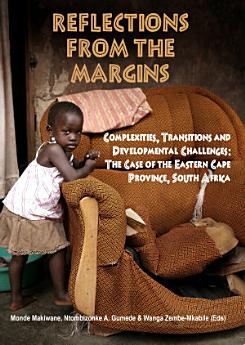Reflections from the Margins: Complexities, Transitions and Developmental Challenges: The Case of the Eastern Cape Province, South Africa
About this ebook
About the author
Monde Makiwane is a C-rated researcher, and an honorary Associate Professor at the DST-NRF Centre of Excellence in Human Development, University of the Witwatersrand, and an Extra-Ordinary Professor at Walter Sisulu University. He is a former Research Director of the Human and Social Development (HSD) research programme of the Human Sciences Research Council (HSRC) in Pretoria, and a Research Associate at the School of Political and Governmental Studies in Nelson Mandela Metropolitan University in Gqebera, South Africa. He holds a Masters in Social Science in Sociology from the University of KwaZulu-Natal and a PhD in Demography from the University of the Witwatersrand. His undergraduate studies were in Mathematical Statistics and Computer Science at the University of the Western Cape. Prior to joining the HSRC in 2003, he worked for a computer service responsible for the analysis of large data sets, including census data, at the Institute for Management and Development Studies. He also lectured undergraduate and graduate students at Walter Sisulu University. In addition, he has held two fellowships: one at Harvard University and the other at the University of Pennsylvania. His areas of research interest include intergenerational relations, ageing, youth, teenage sexuality, fertility, social security, and migration. His publication record includes a number of international and national conference presentations and authoring and co-authoring a number of journal articles.
Ntombizonke A. Gumede is a Research Scientist at the Africa Health Research Institute (AHRI), Social Science and Research Ethics and a Doctoral candidate at the Department of Anthropology and Sociology of the University of Western Cape. Before joining AHRI, she was a PhD researcher in the HSRC’s Human and Social Development research programme in Pretoria. She holds a master’s degree in Social Science in sociology (narrative study of lives) from the University of the Free State. Prior to joining the HSRC, she worked as an intern for the National Research Foundation. She was also an academic facilitator responsible for integrating developmental competencies with academic outcomes with a view to equipping students to achieve academic success in higher education for extended curricula in the Faculty of Humanities, Sociology Department, University of the Free State. She has developed and delivered seminars and workshops covering a wide variety of areas related to the family, children, gender, equity, and transformation. She has coordinated and managed projects, and is experienced in the design, implementation, and analysis of qualitative and quantitative research. Her areas of research specialisation include issues of the family, sexual and reproductive justice, and freedom, participatory action methodologies (quantitative and qualitative), social demography and epidemiology.
Wanga Zembe-Mkabile is a specialist scientist at the South African Medical Research Council (SAMRC), a Senior Research Fellow of the Southern African Social Policy Research Institute (SASPRI), and a Research Fellow at UNISA’s College of Graduate Studies, under the SARChI Chair in Social Policy. Her main interests are research and teaching in social policy, insofar as this relates to poverty and inequality, and the impact thereof on health and well-being. Her work seeks to contribute to understanding the impact of social determinants of health on the health system and to inform the improvement and development of best-practice methods, strategies and policies for addressing and reducing the impact on health and well-being. In this regard her work utilises mixed-methods approaches that focus on social policy in the context of maternal and child health, adolescent health, communicable and non-communicable diseases, multiple deprivation, poverty and inequality.




